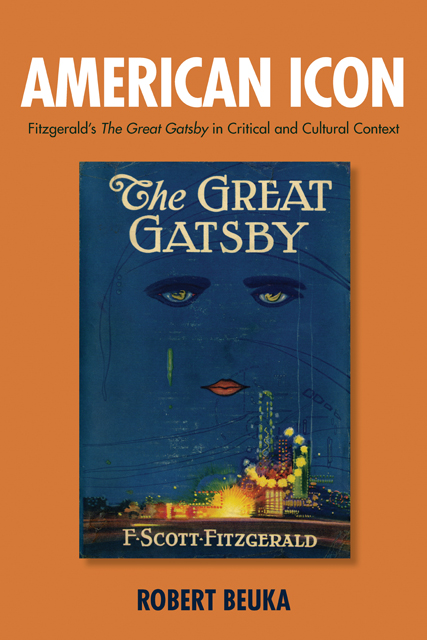Book contents
- Frontmatter
- Dedication
- Contents
- Preface
- 1 A Book of the Season Only: Early Reactions to The Great Gatsby
- 2 A Green Light: The “Fitzgerald Revival” and the Making of a Masterpiece, 1940–59
- 3 The Gatsby Industry: Tracing Patterns and Pushing Boundaries in the Criticism of the Sixties and Seventies
- 4 Gatsby, in Theory (and Out): New Paradigms in the Eighties and Nineties
- 5 Twenty-First-Century G: The Great Gatsby as Cultural Icon
- Works Cited
- Index
3 - The Gatsby Industry: Tracing Patterns and Pushing Boundaries in the Criticism of the Sixties and Seventies
Published online by Cambridge University Press: 11 February 2023
- Frontmatter
- Dedication
- Contents
- Preface
- 1 A Book of the Season Only: Early Reactions to The Great Gatsby
- 2 A Green Light: The “Fitzgerald Revival” and the Making of a Masterpiece, 1940–59
- 3 The Gatsby Industry: Tracing Patterns and Pushing Boundaries in the Criticism of the Sixties and Seventies
- 4 Gatsby, in Theory (and Out): New Paradigms in the Eighties and Nineties
- 5 Twenty-First-Century G: The Great Gatsby as Cultural Icon
- Works Cited
- Index
Summary
Pattern and Perspective: The Focus on Form Intensifies
AS WE HAVE SEEN, during the span of time from F. Scott Fitzgerald’s death to the end of the 1950s, The Great Gatsby went from being a largely forgotten novel — one remembered, if at all, as a period piece of the Roaring Twenties — to an established classic of American literature. Following the popular revival of interest in Fitzgerald’s life and writings, the scholarly revival led to the firm entrenchment of Gatsby in the national canon. Discussion and debate over the novel in the literary journals had taken, by the end of the decade, a fairly predictable shape, with most critical attention divided between issues regarding narrative perspective and form, source and influence studies, and analyses of the symbolic, thematic, and mythic resonances of the book. Though an essay like Stall-man’s “Gatsby and the Hole in Time” threatened to upset the apple cart, for the most part the terms of discussion were stable and well established at this point. The early part of the 1960s saw further exploration of several of these issues: The debate about Nick Carraway’s function, reliability, and character would continue unabated; a number of essays would push the discussion of symbolic patterning in the novel in interesting new directions; and hypotheses about Fitzgerald’s literary influences would remain a mainstay. A series of book-length studies of Fitzgerald’s work would appear over the course of the decade of the sixties, further cementing his place in the canon.
With the political turmoil and civil rights struggles of the later sixties and seventies, interesting things started to happen in the world of Gatsby criticism. Long understood by this point as a novel that reflected the American experience, The Great Gatsby would, with the changing times, come to be analyzed from a whole new range of approaches and perspectives. Scholars writing in an age of civil unrest found new corollaries to modern unease in the novel’s political subtext; critics examined the racial, ethnic, and sexual politics of the novel in ways that had been entirely unaddressed in criticism of the previous generation; feminist critics scrutinized the gender dynamics of the narrative, in the process calling into questions tacit assumptions concerning character and theme made by previous scholars; and other scholars approached the novel from a religious perspective, looking deeper into the spiritual subtext and Catholic imagery of the novel.
- Type
- Chapter
- Information
- American IconFitzgerald's <i>The Great Gatsby</i> in Critical and Cultural Context, pp. 57 - 92Publisher: Boydell & BrewerPrint publication year: 2011



